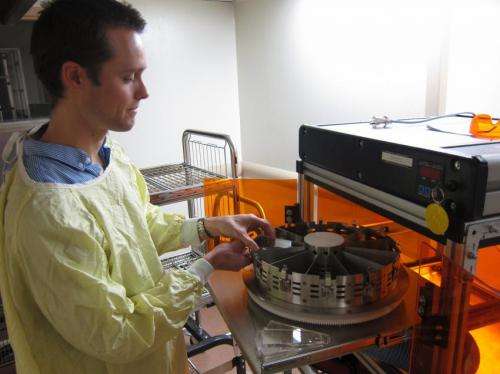Scientists find genetic wrinkle to block sun-induced skin aging

A scientific team at UBC and Providence Health Care have genetically engineered mice with less wrinkled skin, despite repeated exposure to wrinkle-inducing ultraviolet (UV) light.
The youthful-looking mice were bred without the gene that produces Granzyme B, an enzyme that immune cells use to destroy harmful pathogens. The UBC-Providence team, led by Professor David Granville and postdoctoral fellow Leigh Parkinson, found that Granzyme B also does harm: When produced and released by skin cells in response to UV light, it triggers the breakdown of collagen, a structural protein that makes skin firm.
The findings, published last week in Aging Cell, raises hope for a drug that would block the activity of Granzyme B in certain places, and thus prevent the aging and deterioration of tissues that depend on collagen - not just skin, but blood vessels and lung passages.
Granville, a professor in the UBC Department of Pathology and Laboratory Medicine and a principal investigator in the Centre for Heart Lung Innovation of UBC and St. Paul's Hospital, was investigating the role of Granzyme B in atherosclerosis and heart attacks. He and his team wanted to see if the blood vessels of mice lacking Granzyme B were more resistant to hardening and narrowing, which is a major cause of heart attacks in human. In the process, they discovered that such mice retained youthful-looking skin compared to the aged skin on normal mice.
Granville's team constructed an experimental "tanning bed" to simulate sun exposure on mice. Each mouse was put in a carousel that slowly turned under UV lamps, exposing them for three to four minutes, three times a week - enough to cause redness, but not to burn. After 20 weeks of repetitive exposure, it became clear that the skin of mice lacking Granzyme B had aged much less - and their collagen was more intact - compared to the control groups.
viDA Therapeutics, a company co-founded by Granville, is currently developing a Granzyme-B inhibitor based on technology licensed from UBC. The company plans to test a topically applied drug within two years on people with discoid lupus erythematosus, an autoimmune disease worsened by sunlight that can lead to disfiguring facial scarring. (The musician Seal has such a condition.)
If the drug proves effective in preventing lupus-related skin lesions, there is potential for a cosmetic product to prevent the normal, gradual aging of the skin, which is mostly caused by sun exposure. But the drug might also be used for life-threatening conditions, such as aneurysms and chronic obstructive pulmonary disease, caused by the breakdown of collagen and other proteins that provide structure to blood vessels and lung passages.
More information: Granzyme B mediates both direct and indirect cleavage of extracellular matrix in skin after chronic low-dose ultraviolet light irradiation, onlinelibrary.wiley.com/doi/10 … /acel.12298/abstract
















